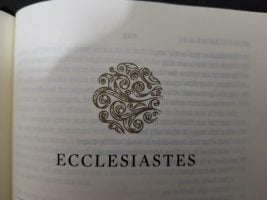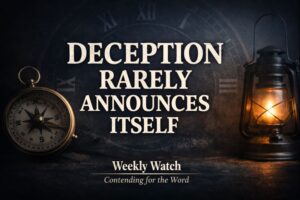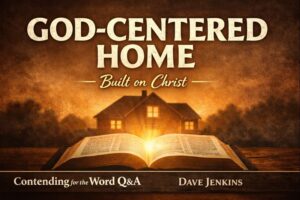⏱️ Estimated Reading Time: 7 min read
In this brief section of Ecclesiastes, the author addresses one of the fundamental issues Christians face: the apparent exaltation of the wicked. We’ve all been there, right? We look around, and there seems to be a serious disconnect between what we think should happen (The good guys win!) and what actually happens (The bad guys win!). What do we do with that?
Thankfully, Ecclesiastes tackles the issue head-on, giving us some vocabulary to talk about the problem and some strategies for dealing with it.
Four Complaints (8:10–11)
Verses 10–11 lists four complaints: “Then I saw the wicked buried. They used to go in and out of the holy place and were praised in the city where they had done such things. This also is vanity. Because the sentence against an evil deed is not executed speedily, the heart of the children of man is fully set to do evil.” The first part of Qohelet’s lament is that the wicked are buried. This, as it happens, should not be, because being buried indicates a certain amount of honor. The wicked, however, should receive no honor because they are, well, wicked.
The second part of the issue is twofold: the wicked a) had access to the holy place, going “in and out of” it, and b) the wicked were praised in the very place where they committed their evil deeds. So, the wicked receive honor from humans and seemingly have access to the very God against whom they sin. This, Ecclesiastes says, “is vanity.” This term, hebel in Hebrew and translated “vanity” by the ESV, actually has a much broader meaning in Hebrew and in fact describes situations in which there is a breakdown between actions and their consequences. That is, things that are hebel are things that are upside-down, like the “opposite day” game we used to play as kids. In using this term, Ecclesiastes is drawing on the story of Abel (hebel in Hebrew), the first instance of the breakdown between actions and rewards—Abel gets the rewards of the wicked (death) while Cain gets the rewards of the righteous (long life, children, wealth). So, for Ecclesiastes, it is upside-down that the wicked would both be praised and have ready access to the holy place—it is hebel, or “Abel-ness” (ESV “vanity”).
To recap: 1) the wicked are buried; 2) the wicked have access to the holy place, and 3) the wicked are praised. Ecclesiastes now issues his fourth and final complaint in this section: “Because the sentence against an evil deed is not executed speedily, the heart of the children of man is fully set to do evil” (8:11). Wickedness abounds because justice does not—because of the lag time between actions and consequences, Ecclesiastes argues, wickedness increases. We see this all the time, right? The American justice system is certainly not known for its speedy resolutions!
Ultimate Reality (8:12–13)
Though Ecclesiastes laments his present reality—what he sees around him—he now transitions to the ultimate reality: “Though a sinner does evil a hundred times and prolongs his life, yet I know that it will be will with those who fear God, because they fear before him. But it will not be will with the wicked, neither will he prolong his days like a shadow, because he does not fear before God” (8:12–13).
Here Ecclesiastes recalibrates his thoughts. Although he recognizes that Abel-ness of verses 10–11, he also recognizes that the ultimate reality is that sinners will not triumph, that ultimately it will go well for “those who fear God” and not for those who do not. But what does it mean to fear God? Ecclesiastes does not have in mind the type of fear that I experience every time there is any sort of turbulence on a flight. This is something different.
When I was a child, my dad once said to me, “Son, do not go into the kitchen.” So,, of course, I headed straight to the kitchen. I ended up with feet all cut up from the glass he had dropped, and a sore bottom from the spanking he administered for disobeying him. Lose-lose. But I did learn a bit about what it meant to fear my dad—obedience because he 1) had my best interest in mind, and 2) he could and would deliver discipline if I disobeyed. Ecclesiastes is describing the same sort of fear: obedience based on the prior establishment of a relationship.
We obey God, or fear him, because we have a relationship with him that is based on his own actions toward us. Of course, the author of Ecclesiastes is talking about a different sort of relationship because he is looking forward to the work of Christ, but on this side of the cross, we look backward and know the work Christ has done on our behalf. Because of that work, we can live in relationship with God. And that—our relationship with God based on the work of Christ—is why we fear or obey, God. We follow Christ not because we are good or in order to earn some sort of right standing before him. No, we follow Christ because he died for us. Out of that, faith comes obedience. And, like Ecclesiastes, we can rest in the knowledge that our present reality is not the ultimate reality. Indeed, “it will be well with those who fear before God, because they fear before him.”
A Final Complaint and a Way Forward (8:14–15)
Ecclesiastes’s final complaint in this section restates his comments in verses 10–12, and he again calls the situation “Abel-ness” (ESV “vanity”): “there are righteous people to whom it happens according to the deeds of the wicked, and there are wicked people to whom it happens according to the deeds of the righteous” (8:14). It simply should not be that the wicked prospers and the righteous suffer, yet that is often the case in this life. And I, for one, am thankful that Ecclesiastes gives voice to this frustration. Abel is the very first example of this upside-downness, and Christ is the ultimate example. Already Ecclesiastes has reminded us to look forward, beyond this life, to the time when all things will be made right, when “it will be well with those who fear God.” And on this side of the cross, our view is much clearer, much sharper, as we rejoice over Christ’s first coming and anticipate his second, all the while acknowledging that the Abel-ness we experience is real.
In addition to looking forward to eternity, Ecclesiastes gives another way of coping with the injustices we see and experience: “And I commend joy, for man has nothing better under the sun but to eat and drink and be joyful, for this will go with him in his toil through the days of his life that God has given him under the sun” (8:15). In the midst of all the frustrations, injustices, and Abel-ness that we will experience on earth, God has given us some things to enjoy: eating and drinking and rejoicing. These, Ecclesiastes says, will go with us through life and provide a present balm as we anticipate the ultimate reality in which all things will be made right. These small things are a foretaste of the great “marriage supper of the Lamb” (Revelation 19:9).




